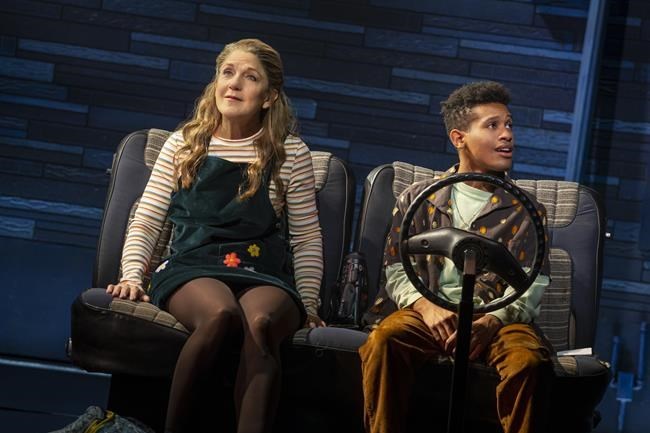
This image released by Polk & Co. shows Victoria Clark, left, and Justin Cooley in "Kimberly Akimbo" in New York. (Joan Marcus/Polk & Co. via AP)
Republished December 20, 2022 - 12:11 PM
Original Publication Date December 19, 2022 - 8:46 AM
NEW YORK (AP) — The seed for one of the best musicals on Broadway this season sprang from an off-hand comment.
Playwright David Lindsay-Abaire asked a friend about his newborn niece and was told she was like a wise old woman trapped in a baby's body.
“I thought, that’s peculiar. So the literal person that I am, I went to a very literal place,” says Lindsay-Abaire. “I started imagining adults as children.”
That imagining soon became an off-Broadway play in 2003 — “Kimberly Akimbo,” about a teen who ages four times faster than the average human. It has now become a musical with songs by Jeanine Tesori that has been hailed by critics for being both wondrously off-kilter and heartfelt.
“We wanted to create an upside-down world,” says Lindsay-Abaire, a Pulitzer Prize-winner who reworked his book and added lyrics. “This is a 16-year-old girl that looks like an old woman. Her parents behave like children and she’s the wisest person in her family.”
“Kimberly Akimbo” stars Tony-winner Victoria Clark as Kimberly, navigating a dysfunctional family and a stuttering high school romance with the knowledge that a rare genetic disorder gives her a life expectancy of 16.
If that sounds like a bummer, it's somehow not. Lindsay-Abaire and Tesori, the Tony-winner behind “Fun Home,” have audiences laughing at the universal awkwardness of being a teen and the loopy things parents do. It's more a musical about seizing the day than facing mortality.
“It’s about family. It's about the time that you spend. It’s about the way that we get liberated by the structures of our family dysfunction,” says Tesori. “You laugh really hard, and that opens you up to be able to be moved.”
Lindsay-Abaire and Tesori worked previously on the Broadway musical based on the animated film “Shrek” and long hoped to collaborate again. Tesori suggested revisiting “Kimberly Akimbo.”
“The play is what I liken to a bouillon cube. It is a distillation and that’s what you need for a musical,” she says. “If there’s not going to be a nurturing source that gives and gives and gives, it’s going to hit the ceiling of its premise. And that is not possible for this play.”
One thing they added that wasn't in the original play was a quartet of teens — Lindsay-Abaire calls them “a chorus of geeks” — who are classmates of Kimberly. “We wanted to present a reflection of the teenager that she is and also the teenager that she can never be,” he says.
When Lindsay-Abaire was first writing the play, he focused a lot on what it felt like to be a teen, admitting that Kimberly and her sweet, puzzle-obsessed love interest, Seth, were in many ways him on stage. This time, he found himself looking differently at the parents.
“Now, 20 years later, to reinvestigate the story and to be a dad of two teenage boys, I dug into the parents in a way that I hadn’t in the play and reflected on what it is like to struggle as a parent,” he says.
Kimberly's parents are Buddy, who drinks a lot and is prone to messing things up, and Pattie, who gets injured a lot. Then there's her aunt Debra, a former convict scheming her next con. Lindsay-Abaire hopes he's added more depth to them, especially the parents who married young.
“I hope we’ve added some more humanity to the parents that maybe I brushed over in the play. They’re still monstrous in a lot of ways, but I feel like the musical parents are much more complicated and nuanced. You see that their horrible behavior is, I think, grounded in their horrible fear of losing their child.”
Kimberly clearly wants her parents to behave like parents and to treat her like the teenager that she is. It's a struggle until she realizes maybe they're incapable of change.
“That's the sort of a realization that I made about my own parents and probably a realization that my children will come to realize about me,” Lindsay-Abaire says.
Both creators believe the musical is much more complex and nuanced, and that the addition of the music allowed them to crack open the characters in new ways.
“There’s some heartfelt stuff in the play, but the emotion that is so overwhelming to an audience I cannot take credit for — that is entirely Jeanine’s genius,” says Lindsay-Abaire.
“She has breathed such life and emotion into the play to make it this completely different thing that affects people in a different way. I feel like it’s such a gift to me and that story.”
___
Mark Kennedy is at http://twitter.com/KennedyTwits
News from © The Associated Press, 2022